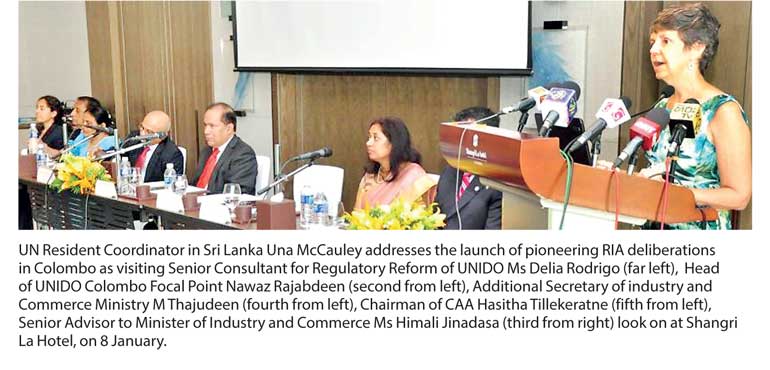Friday Feb 20, 2026
Friday Feb 20, 2026
Wednesday, 10 January 2018 00:00 - - {{hitsCtrl.values.hits}}

By Shannon Jayawardena
A one-day seminar was held on Monday to help Sri Lankan policymakers make informed decisions based on a cost-benefit and effective analysis of various regulations which contribute towards the economic and social development of the country.
The event was organised by the Consumer Affairs Authority (CAA) of the Ministry of Industry and Commerce in collaboration with the United Nations Industrial Development Organisation (UNIDO) alongside a five-day workshop funded by the European Union that provided participants with insights and knowledge on a Regulatory Impact Analysis (RIA).
The seminar gave regulatory authorities and interested stakeholders the opportunity to impart a general understanding of the potential impacts of regulatory decisions. The RIA further worked as a more transparent participative and evidence-based process that would improve the quality of regulations and the welfare of Sri Lankan consumers and producers.
Speaking on behalf of Minister of Industry and Commerce Rishad Bathiudeen, Additional Secretary M.A. Thajudeen said: “I have no doubts that this is the first time that the Ministry of Industry and Commerce, the CAA and even Sri Lank itself is undertaking such an in-depth review of the safeguarding of the consumption of products, services and compliance at a national level, which is a steppingstone for harmonisation and dynamic global standards respected by 100 countries.”
“This effort is of such national importance that we have facilitated the participation of 30 Sri Lankan regulatory bodies in this deliberation to sit together and such a high level participation by national regulatory agencies at the same time is an institutional record of its own for the first time,” he added.
Emergent complexities in consumption such as a lack of transparency in production processes and product labels being not sufficiently reliable, complex supplier and producer liability relations, increasing consumption of similar merchandise across borders and possible ramifications are a few of the concerns that the existing mechanisms in the country are not able to effectively tackle.
Therefore the workshop focused on sharing proper measures for such issues while addressing topics such as regulatory quality as a tool for economic and social development, how to improve the quality of the regulations and the role of a regulatory impact analysis on improving the quality of these regulations. Consumer Affairs Authority Chairman Hasitha Tillekeratne stated: “As the apex regulatory agency working on consumer protection, CAA is empowered to regulate goods as well as services. In addition, there are sector-specific regulations such as the Public Utilities Commission, the Telecommunication Regulatory Commission, Central Environmental Authority, Central Bank of Sri Lanka, Sustainable Energy Authority and the Insurance Board of Sri Lanka to regulate the different sectors. All these agencies are to work on a common theme which is Regulatory Impact Analysis.”
Regulations play an essential role in consumer protection, curtailing pollution, preventing abuses and ensuring safe food and protecting public health. They are crucial in promoting corporate interests as well as in preventing consumer exploitation.
UN Resident Coordinator and UNDP Resident Representative Una Mc Cauley said: “Coming now to a point where we’re having all-important meetings like this one, to assist Sri Lanka with the frameworks that will strengthen the country’s ability to manage governments and policies is truly commendable.” “At present we’re in the process of fostering a food safety policy and a food safety strategy where all procedures come under one national policy. Integrated food standards could be used by the industry, service providers, inspectors and local authorities who control food safety. I hope this leads to the reduction of malnutrition, over-nutrition and hunger in Sri Lanka,” she added.